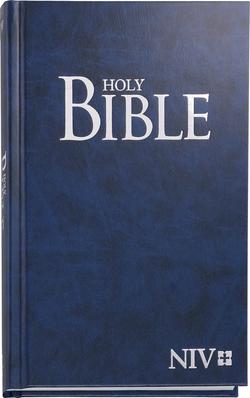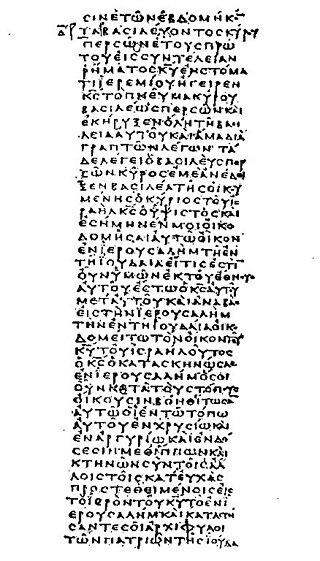Related Research Articles
The Book of Genesis is the first book of the Hebrew Bible and the Christian Old Testament. Its Hebrew name is the same as its first word, Bereshit. Genesis is an account of the creation of the world, the early history of humanity, and the origins of the Jewish people.

The King James Version (KJV), also the King James Bible (KJB) and the Authorized Version (AV), is an Early Modern English translation of the Christian Bible for the Church of England, which was commissioned in 1604 and published in 1611, by sponsorship of King James VI and I. The 80 books of the King James Version include 39 books of the Old Testament, 14 books of Apocrypha, and the 27 books of the New Testament.

The New International Version (NIV) is a translation of the Bible into contemporary English. Published by Biblica, the complete NIV was released on October 27, 1978 with a minor revision in 1984 and a major revision in 2011. The NIV relies on recently-published critical editions of the original Hebrew, Aramaic, and Greek texts.

The Septuagint, sometimes referred to as the Greek Old Testament or The Translation of the Seventy, and often abbreviated as LXX, is the earliest extant Greek translation of the Hebrew Bible from the original Hebrew. The full Greek title derives from the story recorded in the Letter of Aristeas to Philocrates that "the laws of the Jews" were translated into the Greek language at the request of Ptolemy II Philadelphus by seventy-two Hebrew translators—six from each of the Twelve Tribes of Israel.

Judaism considers some names of God so holy that, once written, they should not be erased: יהוה, אֲדֹנָי, אֵל, אֱלֹהִים, שַׁדַּי, and צְבָאוֹת ; some also include I Am that I Am. Early authorities considered other Hebrew names mere epithets or descriptions of God, and wrote that they and names in other languages may be written and erased freely. Some moderns advise special care even in these cases, and many Orthodox Jews have adopted the chumras of writing "G-d" instead of "God" in English or saying Ṭēt-Vav instead of Yōd-Hē for the number fifteen or Ṭēt-Zayin instead of Yōd-Vav for the Hebrew number sixteen.

Elohim, the plural of אֱלוֹהַּ, is a Hebrew word meaning "gods" or "godhood". Although the word is grammatically plural, in the Hebrew Bible it most often takes singular verbal or pronominal agreement and refers to a single deity, particularly the God of Israel. In other verses it refers to the singular gods of other nations or to deities in the plural.

The Joseph Smith Translation (JST), also called the Inspired Version of the Holy Scriptures (IV), is a revision of the Bible by Joseph Smith, the founder of the Latter Day Saint movement, who said that the JST/IV was intended to restore what he described as "many important points touching the salvation of men, [that] had been taken from the Bible, or lost before it was compiled". Smith was killed before he deemed it complete, though most of his work on it was performed about a decade beforehand. The work is the King James Version of the Bible (KJV) with some significant additions and revisions. It is considered a sacred text and is part of the canon of Community of Christ (CoC), formerly the Reorganized Church of Jesus Christ of Latter Day Saints, and other Latter Day Saint churches. Selections from the Joseph Smith Translation are also included in the footnotes and the appendix of the Latter-day Saint edition of the LDS-published King James Version of the Bible. The Church of Jesus Christ of Latter-day Saints' edition of the Bible includes selections from the JST in its footnotes and appendix. It has officially canonized only certain excerpts that appear in the Pearl of Great Price. These excerpts are the Book of Moses and Smith's revision of part of the Gospel of Matthew.
Partial Bible translations into languages of the English people can be traced back to the late 7th century, including translations into Old and Middle English. More than 100 complete translations into English have been produced. A number of translations have been prepared of parts of the Bible, some deliberately limited to certain books and some projects that have been abandoned before the planned completion.

"Let there be light" is an English translation of the Hebrew יְהִי אוֹר found in Genesis 1:3 of the Torah, the first part of the Hebrew Bible. In Old Testament translations of the phrase, translations include the Greek phrase γενηθήτω φῶς and the Latin phrases fiat lux and lux sit. It is part of the Genesis creation narrative.

The Genesis creation narrative is the creation myth of both Judaism and Christianity, told in the Book of Genesis ch. 1–2. While the Jewish and Christian tradition is that the account is one comprehensive story modern scholars of biblical criticism identify the account as a composite work made up of two stories drawn from different sources.

Genesis 1:2 is the second verse of the Genesis creation narrative. It is a part of the Torah portion Bereshit.
Sons of God is a phrase used in the Tanakh or Old Testament and in Christian Apocrypha. The phrase is also used in Kabbalah where bene elohim are part of different Jewish angelic hierarchies.
Hebrew Bible English translations are English translations of the Hebrew Bible (Tanakh) according to the Masoretic Text, in the traditional division and order of Torah, Nevi'im, and Ketuvim. Most Jewish translations appear in bilingual editions (Hebrew–English).

Jehovah is a Latinization of the Hebrew יְהֹוָהYəhōwā, one vocalization of the Tetragrammaton יהוה (YHWH), the proper name of the God of Israel in the Hebrew Bible/Old Testament. The Tetragrammaton יהוה is considered one of the seven names of God in Judaism and a form of God's name in Christianity.
El Shaddai or just Shaddai is one of the names of God in Judaism. El Shaddai is conventionally translated into English as God Almighty.
James Daniel Tabor is an American Biblical scholar and retired Professor of Ancient Judaism and Early Christianity in the Department of Religious Studies at the University of North Carolina at Charlotte, where he taught from 1989 until 2022 and served as chair from 2004 to 2014. He previously held positions at Ambassador College, the University of Notre Dame (1979–85), and the College of William and Mary (1985–89). Tabor is the founder and director of the Original Bible Project, a non-profit organisation aimed to produce a re-ordered new translation of the Bible in English.
Messianic Bible translations are translations, or editions of translations, in English of the Christian Bible, some of which are widely used in the Messianic Judaism and Hebrew Roots communities.

Tohu wa-bohu or Tohu va-Vohu is a Biblical Hebrew phrase found in the Genesis creation narrative that describes the condition of the earth immediately before the creation of light in Genesis 1:3.
The Literal English Version of Scripture (LEV) is a translation of the Bible based on the World English Bible. Formerly known as the "Shem Qadosh Version", the title was officially changed in November 2016. It is considered a Sacred Name Bible rendering the name of God using the Hebrew characters יהוה, and that of Jesus in Hebrew as ישוע. It was created by a team of volunteers across the United States with additional proofing and editing assistance by individuals in Poland and Taiwan. Footnotes and appendices were written by the General Editor, J. A. Brown.
The following outline is provided as an overview of and topical guide to the Bible:
References
- ↑ National Directory of Nonprofit Organizations; Vol. 2. Bohdan Romaniuk, Taft Group (Detroit, Mich.) - 2007
- ↑ GoodReads website, James Tabor
- ↑ Liberal arts through the AGES Augustana General Education Studies ed. Catherine Carter Goebel 2006 Article Genesis Translation of the Transparent English Bible pp69-75
- ↑ Jeffrey J. Bütz, preface James Tabor Secret Legacy of Jesus: The Judaic Teachings That Passed from.. 2010 p.xi "He is codirector of the Mt. Zion Archaeological Expedition and also serves as main editor of the Original Bible Project, an ongoing effort to produce a new translation of the Bible."
- ↑ Celia Brewer Sinclair James Tabor Invitation to the Old Testament: Disciple Short-term Studies, ... "Dr. Tabor was chief editor of the Original Bible Project, an effort to produce a historical, linguistic translation of the Bible with notes."
- ↑ Lockietta Greene The Honored Promise p156 "And according to the translators of The Original Bible Project: The Hebrew word neged means “opposite, before, against, comparable to.” This precise expression here, lit. “as before him” implies that the woman is to stand opposite the ..."
- ↑ Carlton Pearson God Is Not a Christian, Nor a Jew, Muslim, Hindu 2010 p46 "The Original Bible Project (Dr. Tabor, still in translation) 0 0 0"
- ↑ William West The Resurrection and Immortality 2006 p181 "The Original Bible Project (Dr Tabor) 0 times "
- ↑ Roland H. Worth Biblical studies on the Internet: a resource guide 2008 p.vi "Transparent English Bible: Genesis (1)"
- ↑ Amazon website, The Book of Genesis: A New Translation from the Transparent English Bible
- ↑ Amazon website, Selections from the Hebrew Bible: A New Translation from the Transparent English Bible